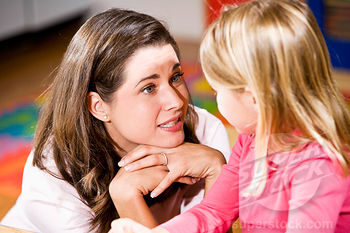 |
| Teach, don't punish |
 |
| My Turn-a-Card System |
The saying goes, "as we know better, we do better". I have certainly learned a lot through my journey as an educator, and some of my earlier practices would not be found in my classroom today (if I had a classroom).
While I don't necessarily agree with all of the decisions and instructional practices that "past Maureen" supported, only one actually haunts me. OK, haunt is being dramatic, but I do feel strongly that if I could only go back and change one thing, this would be it.
Confession time...I had a public behavior chart in my classroom.
Yes, it pains me to say it, but I had one. It was the "turn a card" system, where each student had a pocket in a chart with a green, yellow, and red card. Each child started the day on green, and if a behavior infraction occurred, the child would be directed to change their card to yellow. Further infractions would result in a red card and a call home. A card with the student's name on it sat in the front of the pocket. If no infractions occurred during the day, a small sticker would be placed on the card. At the end of each week, the card would go home for parent signature.
Ugh! How did I ever think that this public display of humiliation was good for my students and my classroom? Whenever I instructed a child to turn a card, I was stopping instruction to publicly draw attention to the behavior while embarrassing the child. Tears were usually part of this process.
Not only did I bring attention to a child's behavior in front of their peers, but I also knew that daily behavior reports (AKA who turned a card that day) were often the subject of family dinners in the homes of my students.
Cringing!!
Don't get me wrong. I understood developmental appropriateness and the importance of student engagement, collaboration, and interaction. My classroom was never a quiet classroom, and I didn't expect that of my 6, 7 , and 8 year olds. I was not a "yeller" (usually) and I could handle (and adored) active and excited children who were still learning self-regulation. I was not "crazy-card-turning-teacher" and my students most often went home each Friday with five stickers on their name card.
But I did do it...
now I know better.
I now have a better understanding of the importance of supporting children on the path to self-regulation and impulse control. A misstep in behavior should be an opportunity to teach, not punish.
If a child is being punished for a behavior, they are not learning alternatives that help them grow and make appropriate decisions in the future.
I have learned many lessons about social-emotional learning and positive discipline from my friend Elizabeth Merce (www.emercedlearning.com @emercedlearning #DitchTheClips). Elizabeth always stresses the importance of teaching social-emotional learning skills as you would any other subject.
For example, if a student is struggling with a concept in math, we don't call this out to the rest of the class or embarrass the student for their struggles. We use data to determine where the child is struggling, and then we provide scaffolding to support their learning. We must treat SEL this same way.
So I would like to offer this apology to any child I ever publicly shamed or embarrassed through my behavior management system.
The research and the case against public behavior charts is growing. Here are just a few to check out. If you are still using a chart in your classroom, please read the research and do what is best for kids.
Resources:
Podcast: Leader of Learning Podcast: Social Emotional Learning: Rethinking Student Discipline with Elizabeth Merce
Blog: Ditch the Clips: Create a Behavior Management System That Works (Elizabeth Merce)
ASCD Article: Tear Down Your Behavior Chart (Lee Ann Jung & Dominique Smith)
Article: 6 Reasons to Question Using Behavior Charts (Tony Kline, Ph.D)
Article: Why I Will NEVER Use a Behavior Chart Again

No comments:
Post a Comment